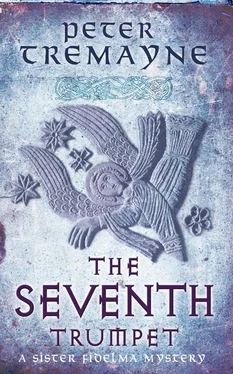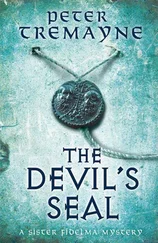Peter Tremayne - The Seventh Trumpet
Здесь есть возможность читать онлайн «Peter Tremayne - The Seventh Trumpet» весь текст электронной книги совершенно бесплатно (целиком полную версию без сокращений). В некоторых случаях можно слушать аудио, скачать через торрент в формате fb2 и присутствует краткое содержание. Год выпуска: 2012, ISBN: 2012, Издательство: Headline, Жанр: Исторический детектив, на английском языке. Описание произведения, (предисловие) а так же отзывы посетителей доступны на портале библиотеки ЛибКат.
- Название:The Seventh Trumpet
- Автор:
- Издательство:Headline
- Жанр:
- Год:2012
- ISBN:9780755377527
- Рейтинг книги:5 / 5. Голосов: 1
-
Избранное:Добавить в избранное
- Отзывы:
-
Ваша оценка:
- 100
- 1
- 2
- 3
- 4
- 5
The Seventh Trumpet: краткое содержание, описание и аннотация
Предлагаем к чтению аннотацию, описание, краткое содержание или предисловие (зависит от того, что написал сам автор книги «The Seventh Trumpet»). Если вы не нашли необходимую информацию о книге — напишите в комментариях, мы постараемся отыскать её.
The Seventh Trumpet — читать онлайн бесплатно полную книгу (весь текст) целиком
Ниже представлен текст книги, разбитый по страницам. Система сохранения места последней прочитанной страницы, позволяет с удобством читать онлайн бесплатно книгу «The Seventh Trumpet», без необходимости каждый раз заново искать на чём Вы остановились. Поставьте закладку, и сможете в любой момент перейти на страницу, на которой закончили чтение.
Интервал:
Закладка:
Fidelma shook her head. ‘If so, why was the body not reported by the person who disturbed the killer?’
‘It seems,’ Eadulf reflected, ‘that we are engaging in speculation when we have no information.’
Fidelma glared at him before noticing the amusement in his features. The corners of her mouth turned down with a wry expression.
‘So now we must start in pursuit of information,’ she said in a firm tone. She turned to Tóla. ‘We need trouble you little. Perhaps we can fodder our horses and obtain some refreshment for ourselves when we have finished here? It would help if we could also purchase a linen sheet for use as a racholl — a shroud — for the body. We shall take the corpse to the chapel you spoke of, at Fraigh Dubh and make use of the burial-ground there. We may have to travel all the way to Laigin to establish the identity of this young noble: the body cannot be preserved during such a long journey and must therefore be interred here.’
‘You are welcome to what hospitality we can provide,’ Tóla said politely.
‘Then we will not interrupt your harvesting any further. We have a few things to do here first.’
The farmer left them while Fidelma began to give instruction to the others.
‘Secure the horses to those bushes, Enda. Then I want you to walk a distance along the bank of this stream towards the east. Watch out for any sign of the passage of horses. Gormán, I want you to examine the bank to the west.’
The two warriors moved off immediately.
Fidelma stood for a moment looking down at the broken rowan wand that she still held in her hands, and wondering where the top was.
‘It is usually the top part which bears the emblem of the holder of the office. See if you are able to find it, Eadulf. Search the body thoroughly, if you will. It may have broken off as he fell. I am going to check the stream, for if it fell in there, the gold mounting from the top will have caused it to catch on the bed of the stream.’
There was a silence as they both bent to their tasks. Eadulf not only carefully checked through the clothing on the corpse but thoroughly searched the muddy bank nearby. There was no sign of the splintered top piece of the wand of office, and when he glanced at Fidelma, she was wading out of the stream looking disappointed.
‘Nothing,’ she said. ‘No sign of it.’
A few moments later, Gormán came along the bank of the stream.
‘I went as far as the point where the stream empties into the Suir,’ he reported. ‘Along the path there were long stretches of hardened earth, but where there were also muddy stretches with signs of horses’ tracks, these were obscured by the passage of sheep and cattle. Is Enda not back yet?’
As if on cue, they saw the warrior trotting towards them along the embankment.
‘Anything?’ Fidelma asked hopefully.
‘A short distance from here, there is a bend in the stream and a muddy stretch of ground by it. There are signs that two horses emerged from the stream at that point. However, it is difficult to say how long ago the prints were made. I would estimate that it was not long because the ground is soft and muddy. There has been no time for the tracks to dry.’
‘Any sign of footprints?’
‘Whoever was on the horses did not dismount. I only saw prints of cows and wolves, but nothing else of significance. The prints of the horses led eastwards. I followed them as far as I could, but soon lost them when the ground became hardened. They were heading towards the highway that leads north to Durlus Éile or south to Cashel.’
There was a brief silence as Fidelma and Eadulf absorbed the information. Then Fidelma said: ‘Well, there is little more we can do here. Eadulf, can you and Enda remove all the valuable items from the corpse, the sword and dagger as well as anything else that might provide a means of identity? We’ll go to the farmhouse and get the winding sheet. Then we’ll take advantage of Tóla’s hospitality to feed the horses and refresh ourselves before moving on.’
It was after midday when Fidelma and her companions recommenced their journey from the farmstead of Tóla where his wife, Cainnear, had fed them, and his son Breac had tended their horses. The body of the unknown envoy had been wrapped in a linen sheet and strapped across the back of Enda’s horse. The four of them had then set out due east along the banks of the stream. A short time later, they recrossed the stream and turned a little southward on to the edge of a rough stretch of uncultivated land called Fraigh Dubh.
Here was the burial-ground to which the people of the area took their dead, and the small chapel where they went to receive blessings. The chapel lay close by the main highway that eventually connected Cashel to the northern township of the kingdom, Durlus Éile, the strong fortress of the Éile, whose territory bordered the lands of the Osraige; beyond this was the covetous Kingdom of Laigin.
They crossed the highway along which merchants and pilgrims travelled in both directions; although it was usually very busy, it was not classed as one of the five great highways that united the Five Kingdoms, such as the Slige Dála that connected Cashel to the Palace of the High King at Tara. This smaller highway was classed as a bothar — a cattleway — for it was along earlier tracks in ancient times that people herded their cattle to market and, indeed, still did so. At this hour, the highway was deserted, for most people liked to travel early in the mornings and then halt to take refreshment at midday when the sun stood at its zenith. By the time the day became cooler, their refreshment had usually influenced them to delay their journey until the following morning. Therefore it was not surprising that the small party encountered no one as they joined the highway and crossed to the little wooden chapel that stood on the edge of the wild heathland.
Surrounding the construction was the burial-ground, each grave aligned east to west. It was to the west that people believed the souls of the dead were taken, even in the earliest times before the coming of the New Faith. It was obvious to Fidelma’s eyes that this was a poor, rural burial-ground, for there were but few wooden crosses, some weathered in the passing of the years. From the time of the coming of the Faith it had become customary to erect a cross over the grave of a Christian. But those of rank would have a flat slab or a pillar stone erected on which was inscribed a name, sometimes in the characters called Ogham and sometimes in Latin. She noticed that there were no such stone grave-markers here.
As they approached the chapel, they heard the sharp blows of a hammer, striking hollowly, and saw the figure of a man on the roof, securing some roofing boards. A ladder leaned against the side of the building.
Fidelma gave a quick nod to Gormán, who leaned back in his saddle and called up, ‘God bless the work, Brother.’
The man paused and looked down before he removed a couple of nails that he was holding between his lips. He carefully replaced them, and his hammer, in a sling in his belt, before he returned the greeting. ‘He does bless this work, indeed, warrior. But I am no Brother. Just an ailtirecht .’
Eadulf had to think for a moment, confusing the word with ailithir , a pilgrim, before realising that ailtirecht meant a craftsman in wood.
Fidelma edged her horse forward and looked up towards the workman. ‘What is your name?’ she asked.
The man peered down and then, appearing to recognise her, he left his position and slid down the ladder with surprising dexterity before coming to stand at her horse’s head. He was a weathered-looking man of medium height with greying hair and light blue eyes, obviously used to heavy work. He bowed his head in respectful acknowledgement to her.
Читать дальшеИнтервал:
Закладка:
Похожие книги на «The Seventh Trumpet»
Представляем Вашему вниманию похожие книги на «The Seventh Trumpet» списком для выбора. Мы отобрали схожую по названию и смыслу литературу в надежде предоставить читателям больше вариантов отыскать новые, интересные, ещё непрочитанные произведения.
Обсуждение, отзывы о книге «The Seventh Trumpet» и просто собственные мнения читателей. Оставьте ваши комментарии, напишите, что Вы думаете о произведении, его смысле или главных героях. Укажите что конкретно понравилось, а что нет, и почему Вы так считаете.











